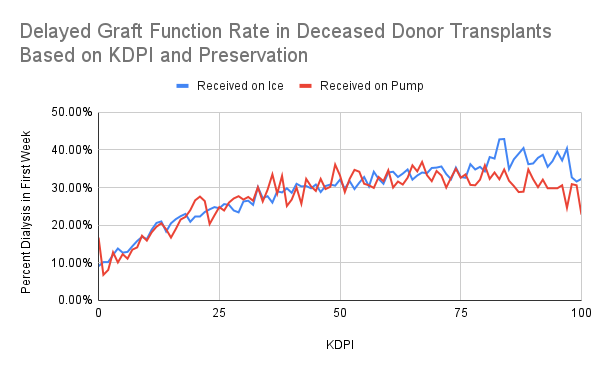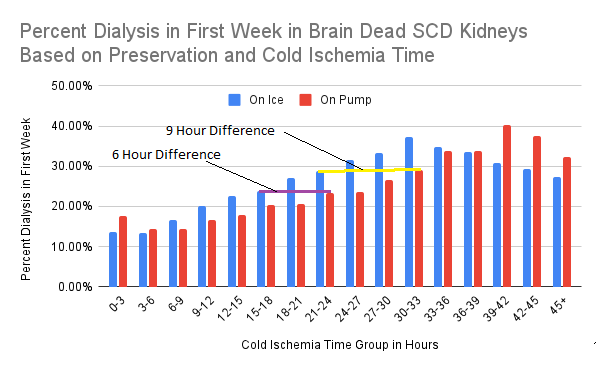Cold Pulsatile Perfusion Preservation of Deceased Donor Kidneys Did Not Improve Delayed Graft Function Rates in Most Transplants Due to Longer Cold Ischemia Times Offsetting Much of the Benefit, Analysis of SRTR Database
Kidney Transplant, Ascension Sacred Heart Hospital, Pensacola, FL
Meeting: 2022 American Transplant Congress
Abstract number: 1777
Keywords: Cadaveric organs, Graft function, Kidney transplantation, Pulsatile preservation
Topic: Clinical Science » Organ Inclusive » 68 - Deceased Donor Management and Intervention Research
Session Information
Session Name: Deceased Donor Management and Intervention Research
Session Type: Poster Abstract
Date: Tuesday, June 7, 2022
Session Time: 7:00pm-8:00pm
 Presentation Time: 7:00pm-8:00pm
Presentation Time: 7:00pm-8:00pm
Location: Hynes Halls C & D
*Purpose: To determine the impact of cold pulsatile perfusion preservation (CPPP) on delayed graft function (DGF) in a national cohort of US kidney transplants as currently implemented.
*Methods: All deceased donor kidney transplants in the United States from 1/1/2020 to 9/2/2020 were identified in the SRTR database. The rate of DGF was determined by the need for dialysis in the first week post-transplant. Preservation status of the kidney was determined by how the kidney was received at the transplant center, either on ice or pump. Logistic regression was used to determine the impact of pumping on different donor types.
*Results: 137,806 deceased donor kidney transplants were identified of which 1.4% and 1.3% were missing data for DGF and organ preservation respectively and were excluded. The unadjusted rate of DGF for all kidney transplants showed that only ECD kidneys had a reduction in DGF rate with pumping.
Subset analysis of donor types and cold ischemia time is shown in table.
| Mean Cold Ischemia Time in Hours (Standard Deviation) | |||
| Donor Type | On Pump | On Ice | Significance |
| Brain Dead SCD | 20.4 (9.7) | 15.5 (8.1) | <0.001 |
| ECD | 22.0 (9.3) | 18.6 (8.4) | <0.001 |
| DCD | 19.5 (7.6) | 18.5 (8.9) | <0.001 |
In decreasing order of difference, brain dead SCD, ECD and DCD donors on pump had longer cold ischemia times. Logistic regression for DGF showed that pumping reduced DGF for all donor types. Delaying implantation of graft on pump for more than 6 to 9 hours negated its impact on DGF.
*Conclusions: In practice for brain dead SCD donors, CPPP preservation did not improve the rate of DGF substantially when compared to static storage due to longer cold ischemia times. Pumped ECD kidneys did show a decrease in DGF in part due to less difference in cold ischemia. For DCD donors the cold ischemia times were similar suggesting more urgency for implantation of these donor. Current pumping practices lead to longer cold ischemia times in brain dead SCD and ECD negating some or all of the benefits of pumping at reducing DGF.
To cite this abstract in AMA style:
Keith DS, Lessmann E. Cold Pulsatile Perfusion Preservation of Deceased Donor Kidneys Did Not Improve Delayed Graft Function Rates in Most Transplants Due to Longer Cold Ischemia Times Offsetting Much of the Benefit, Analysis of SRTR Database [abstract]. Am J Transplant. 2022; 22 (suppl 3). https://atcmeetingabstracts.com/abstract/cold-pulsatile-perfusion-preservation-of-deceased-donor-kidneys-did-not-improve-delayed-graft-function-rates-in-most-transplants-due-to-longer-cold-ischemia-times-offsetting-much-of-the-benefit-analy/. Accessed February 19, 2026.« Back to 2022 American Transplant Congress


